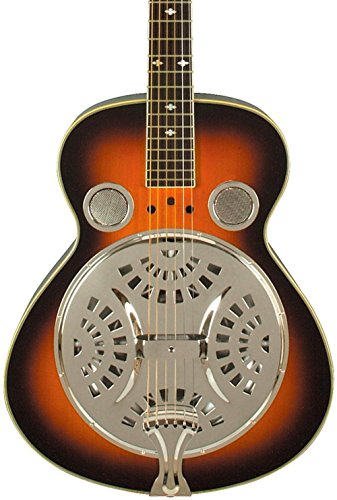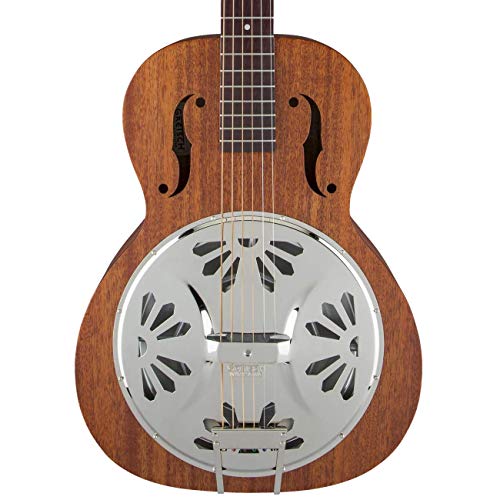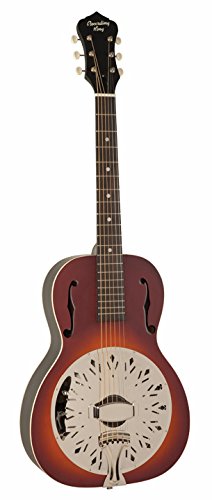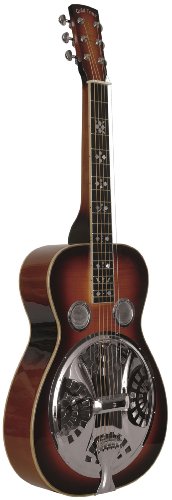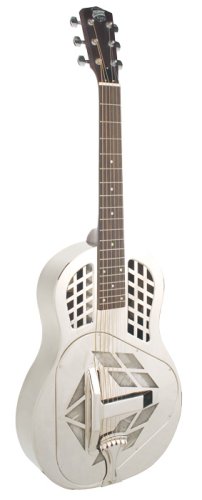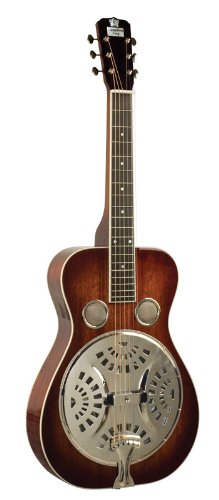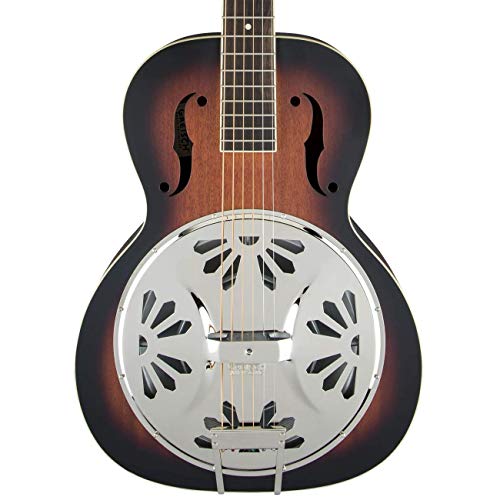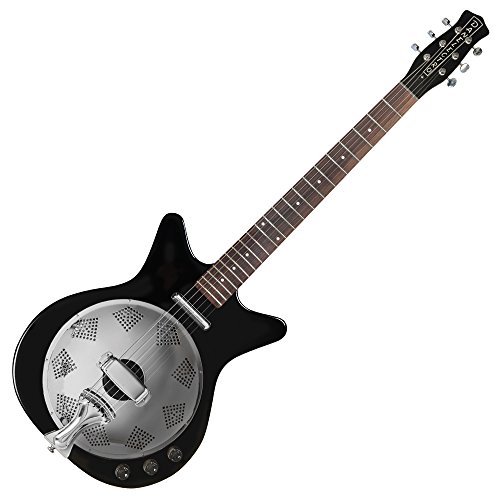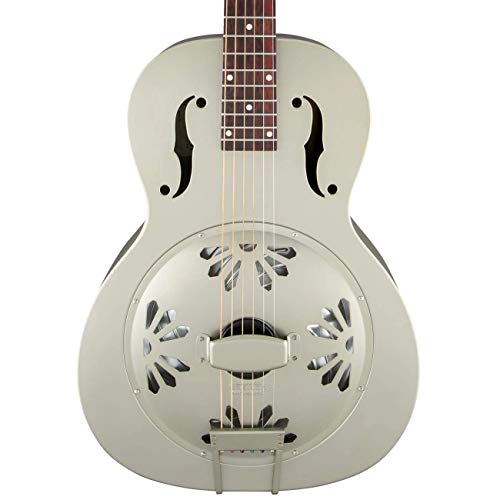10 Best Dobro Resonator Guitars (2020 Reviews)
Resonators are an iconic instrument in traditional Americana. Recent innovations in electronics and new tonewood applications have resulted in some truly extraordinary instruments.
There are many important considerations to make when looking for the best resonator guitar, including the materials used, the scale length, the number of frets and other neck specifications, and the design and number of cones inside the instrument. Check out our resonator guitar reviews below.
The 10 Best Resonator Guitars
1. Epiphone Dobro Hound Dog Round-Neck Resonator Guitar - Best Overall
Specifications
Scale Length: 25″
- Number of Frets: 19
- Nut Width: 1.75″
- Fingerboard: Rosewood
- Neck Shape: Round
The Dobro has been an iconic instrument in bluegrass and traditional American music since the 1920s (1). The Epiphone Dobro Hound Dog is a great contemporary example of this classic instrument. The Epiphone features a laminated flame maple top, a set mahogany neck, and an ebony-capped maple base bridge with a rosewood fingerboard. These tonewoods combine to create a rich and warm sound that perfectly captures the vintage look of the instrument and the set mahogany neck means you will have an instrument that feels as solid as it looks. Check out this video to hear the Epiphone Dobro Hound Dog in action:
The Dobro Hound Dog comes equipped with a Fishman™ resonator pickup, providing robust and natural amplification that helps maintain its beautiful acoustic tone. The Dobro Hound’s nickel-plated cone and fan plate deliver that timeless resonator timbre you are seeking and two f-holes on either side of the neck help the instrument project. This resonator is loud enough on its own for most playing situations, but the added high-quality pickup will be a welcome help in any louder-than-usual performances. This resonator also features reliable Grover tuning machines which are a great addition at this price point to help the instrument stay rock solid and in tune.
The Epiphone Dobro Hound Dog is an excellent overall choice. The choice of tonewoods, quality hardware, and the added Fishman pickup combined with Epiphone’s tradition of solid construction are a great value for the hobbyist and serious player alike. This resonator is comparable to others twice or three times the price.
2. Rogue Classic Spider Resonator Sunburst Round-Neck - Budget Pick
Specifications
Scale Length: 25″
- Number of Frets: 21
- Nut Width: 1.75″
- Fingerboard: Rosewood
- Neck Shape: Round
The Rogue Classic Spider Resonator Round-Neck is the best budget model resonator guitar available. It is an affordable introduction into the resonator for under $250. The Rogue Classic Spider features a beautiful spruce top and mahogany back and sides, creating a nice blend of light and warm tonewoods. The mahogany neck and rosewood fretboard combine for a smooth and stable neck that looks great for the price. The round-shaped neck means that the Rogue Classic Spider can be held like a traditional acoustic guitar.
This resonator does not come with a built in pickup, but the die-cast spider bridge and 10-1/2″ spun aluminum resonator cone give it excellent projection and volume at a great budget. Mother-of-pearl diamond fretboard inlays, a chrome-plated bell, and brass cover plate and tailpiece give the instrument an authentic look.
This resonator is perfect if you are interested in a resonator that sounds and looks good for an affordable price. Rogue is known for their entry-level instruments, so don’t expect professional-level quality. This is a great resonator for a beginning player and awesome for casual use or as a backup on a gig. Of course, all the hardware, like the cheap tuning machines, can always be upgraded later!
3. Gretsch Guitars G9200 Boxcar Round-Neck Resonator Guitar Natural - Best Vintage Replica
Specifications
Scale Length: 25″
- Number of Frets: 19
- Nut Width: 1.75″
- Fingerboard: Padauk
- Neck Shape: Soft V
The G9200 Boxcar is a faithful contemporary replica of a vintage classic. It is part of Gretsch’s Root Series and wins the award for Best Vintage Replica. This instrument stays true to the first resonators’ design and features a semi-gloss finish on the body and neck that reveals a beautiful natural grain. The guitar’s mahogany neck and padauk fretboard lend a warm and resonant feeling and the soft V shape neck provides just the right amount of comfort.
This resonator is built with Gretsch’s Ampli-Sonic diaphragm resonator cone. This aluminum cone is hand-spun in Eastern Europe and kicks out an impressive level of volume and mesmerizing and rich midrange. The Gretsch Boxcar does not come with a pickup installed. However, a contact pickup could always be attached! The ebony-tipped maple spider bridge combined with the Gretsch vintage style resonator tailpiece and Grover Sta-Tite tuning machines keep the G9200 Boxcar tight and in tune no matter the style you are pursuing.
A great looking resonator at a reasonable price, the Gretsch G9200 Boxcar is an attractive choice for that vintage flair and feel. This instrument channels the character of a vintage resonator and is built well enough to enhance the quality of your music no matter if you are interested in country, bluegrass, blues, or something else entirely.
4. Recording King RPH-R1-TS Dirty 30’s Resonator Guitar - The Smallest
Specifications
Scale Length: 25.4″
- Number of Frets: 20
- Nut Width: 1 11/16″
- Fingerboard: Rosewood
- Neck Shape: Contemporary C
Don’t let its size fool you, Recording King’s Dirty 30s resonator delivers tons of classic style and a vintage resonator tone perfect for old-school blues and slide players. Despite being the smallest instrument on this list, a great spruce top, white wood back and sides, and nato neck with ivory binding combine to create a unique and iconic instrument. Many resonator guitars have measurements similar to a dreadnought acoustic, which smaller musicians may find uncomfortable. For this reason, the Recording King Dirty 30s is a comfortable and cool instrument
The Dirty 30’s traditional resonator sound emanates from a single, hand-spun 0 size European 9.5″ cone in a pedestal sound-well. Sound posts support the sound-well circle and the cone vibrations are free to bounce within the full cavity of the body. The f-holes optimize bass and treble frequencies as they exit the body for the perfect dry and throaty resonator tone. A biscuit shape bridge, ebony and maple saddle, and a dovetail neck joint provide excellent tone and stability. The contemporary C neck shape and rosewood fretboard make for smooth and easy action whether you are playing with or without a slide. The instrument does not have a built-in pickup, so you will need to add one if you want to be amplified.
The Recording King’s Dirty 30s resonator is a perfect choice for a musician looking for a quality instrument at a smaller size at a great price. The Dirty 30’s smaller build does not sacrifice anything for tone or style and is an affordable quality choice for a serious player.
5. Gold-Tone Paul Beard Signature Series PBS-D Square-Neck Resonator Deluxe Guitar
Specifications
Scale Length: 25″
- Number of Frets: 19
- Nut Width: 1 7/8″
- Fingerboard: Ebony
- Neck Shape: Square
An exceptional instrument produced by musical legend Paul Beard, the Gold-Tone PBS-D square-neck resonator lives up to its name, providing fantastic sound quality and playability for a significant price. This PBS-D is the second most expensive instrument on the list, and for good reason! The PBS-D is a well appointed instrument. The PBS Deluxe has an amazing curly maple body and a hard rock square maple neck, and a rich tobacco sunburst finish.
The Deluxe comes with the famed Paul Beard “open” sound-well, resonator cone, and spider bridge. This combination produces the sweet wood-and-metal tone that’s so ideal for Bluegrass steel playing. Metal Die-Cast tuning machines, chrome-plated hardware, and a Paul Beard 6-String tailpiece make for rock-solid tuning for any style. This instrument’s square-neck means it must be played with a slide.
The PBS-D comes with three pickup options: the Paul Beard Fishman Active Pickup, Paul Beard Fishman Passive Pickup, or the Paul Beard Fishman Passive Nashville Spider Pickup. All three are excellent choices for any style and setting and set the PBS-D apart from other instruments on this list. The Gold-Tone Paul Beard Signature Series PBS-D square-neck resonator is a high-end instrument that is perfect for the professional looking for a high quality instrument, a collector who is impressed by its beauty, or an amateur who wants an instrument that will motivate them to perfect their playing!
6. Recording King RM-991 Tricone Resonator
Specifications
Scale Length: 25.5″
- Number of Frets: 19
- Nut Width: 1 15/16″
- Fingerboard: Padauk
- Neck Shape: Square
Another higher-end, expensive model, the Recording King RM-991 Tricone resonator is the first resonator on the list to feature an all metal body. The RM-991 is made from nickel-plated brass and because of this is much louder acoustically than the other guitars on this list. The RM-991 also features a Honduran mahogany square-neck with an ebony fretboard, giving warmth and depth to the brass body.
This resonator has three hand-spun 6″ European Recording King aluminum cones, hence the name Tricone. These three resonator cones transfer incredibly loud tones through the guitar body. Two bass side cones and one treble side cone combine for a sweet, warm EQ balance and a distinct timbre and long sustain characterized by brilliant overtones. The body has a screen cover plate and a T-shaped bridge with an ebony and maple saddle that connects to each cone center so that string vibrations run through the saddle and then into the bridge. This adds to the already impressive sustain of the instrument.
The Recording King RM-991 is a high-end instrument designed for a player looking for a beautiful and complex resonator and who plays exclusively with a slide. This instrument will cut through louder ensembles without amplification and is certainly worthy of professional stages and recording sessions.
7. Recording King Professional Round-Neck Resonator Guitar, Mahogany, Vintage Sunburst
Specifications
Scale Length: 25″
- Number of Frets: 19
- Nut Width: 1-11/16”
- Fingerboard: Ebony
- Neck Shape: Round
The Recording King Professional round-neck resonator guitar is a great example of an affordable and quality resonator. The Recording King Professional features a sturdy mahogany neck and body and a fast ebony fretboard for great playability and tone. The round neck shape means it can be played with or without a slide and the Mother-of-Pearl dot inlays and vintage sunburst finish imbue a subtle, nostalgic sense of style.
The Recording King Professional features a single, hand-spun aluminum resonator cone which conjures authentic and bright sounds. Two rounded sound hole screens boost the style while simultaneously enhancing the instrument’s sustain. The Recording King Professional does not come with a built-in pickup, but like many of the other resonators on this list, it should be plenty loud for most professional performance and recording situations. After all, the resonator was created to cut through the overwhelming sound of an acoustic ensemble (2).
The Recording King Professional is comparable in quality to the Epiphone Dobro Hound Dog and the Gretsch G9200 models but slightly more expensive. In terms of hardware the four resonators are also quite similar. The only thing that sets the Recording King Professional apart is the ebony fretboard and vintage sunburst finish.
8. Gretsch G9220 Bobtail Round-Neck Acoustic-Electric Resonator Guitar
Specifications
Scale Length: 25″
- Number of Frets: 19
- Nut Width: 1.75″
- Fingerboard: Padauk
- Neck Shape: Medium V
A step up from the Gretsch G9220 Boxcar is the Gretsch G9220 Bobtail. The G9220 Bobtail builds upon the successful qualities of the Boxcar and aesthetically amplifies them. The G9220 Bobtail’s two-tone sunburst and vintage semi-gloss finish is the main thing that sets this instrument apart from its relative on the Gretsch line. The G9220 Bobtail also features a laminated mahogany top, back, sides, and neck and comes with a padauk fretboard. This choice of wood makes for a heavy and dark sounding guitar.
The G9200 Bobtail still features Gretsch’s Ampli-Sonic diaphragm resonator spider cone, which provides an authentic and classic tone for many styles. The instrument will be plenty loud for most ensembles and does come with a built-in Fishman Nashville Resophonic pickup for those times when you need a little extra volume on stage. The high-quality Grover Sta-Tite Die-cast and the bone nut mean the Bobtail will stay in tune and intonated well.
The Gretsch G9200 Bobtail is a quality intermediate-level instrument. A step above the slightly less expensive Boxcar model, the Bobtail’s two-tone sunburst and vintage semi-gloss finish and the built-in Fishman Nashville pickup combine for an excellent and functional instrument for the professional and amateur alike.
9. Danelectro ’59 Acoustic-Electric Resonator Guitar
Specifications
Scale Length: 25″
- Number of Frets: 21
- Nut Width: 1.65″
- Fingerboard: Pau Ferro
- Neck Shape: C
The Danelectro ’59 Acoustic-Electric Resonator is probably the most non-traditional resonator of the list. The Danelectro ’59 features a spruce back and sides, maple neck, and hardwood top in Danelectro’s iconic double-cutaway body style, making for a lightweight instrument. The pau ferro fretboard and Danelectro’s extremely playable C shape neck make this a stand out resonator.
The Danelectro’s double-cut body is adorned with a tone-enhancing diamond plate cover. A lipstick single-coil pickup combines with a cone-mounted piezo to deliver a multitude of amplified sonic textures. Standard volume and tone controls along with a pickup blend control allows you to achieve your ideal balance between plinky attack and brassy resonance. This is perfect for higher-volume performance situations and could be a huge asset in a recording session where you want a combination of electric and acoustic sounds.
The classic Danelectro double-cut body is perfect for players who are not attracted to a traditional resonator guitar’s generally bulky body. The spruce back and sides, maple neck, and hardwood top combine with the black finish and iconic Danelectro vibe makes this the perfect choice for the player interested in a less than traditional instrument that still has a great sound and looks stylish.
10. Gretsch G9201 Honey Dipper Round-Neck Metal Resonator
Specifications
Scale Length: 25″
- Number of Frets: 19
- Nut Width: 1.75″
- Fingerboard: Padauk
- Neck Shape: Medium V
Another resonator with an all metal body, the Gretsch G9201 Honey Dipper Round-neck resonator is full of character and style. The Honey Dipper features a bell brass body for increased resonance, sustain and volume and the weathered finish gives it a classic and nostalgic look. A medium V mahogany neck with Gretsch’s vintage semi-gloss finish and a warm padauk fingerboard round out an extremely playable and fun instrument.
Like the other examples on this list from Gretsch’s Roots Series, the Honey Dipper features Gretsch’s hand-spun Ampli-Sonic diaphragm biscuit resonator cone. This resonator cone combined with the full metal body will produce a loud enough volume for most acoustic performance and recording situations. However, the guitar does not come with a built-in pickup, so you would need to purchase one. The Honey Dipper’s hard maple bridge, ebony and maple saddle, bone nut, and Grover Sta-Tite Die-cast are high-quality items and mean the instrument will stay in tune and intonated well.
Overall, the Gretsch G9201 Honey Dipper is an excellent choice if you are looking for a less expensive but quality metal body resonator. Gretsch’s craftsmanship, attention to detail, and history of quality resonators means you will not be disappointed with this choice.
Things to Consider When Purchasing a Resonator Guitar
Consider the Tonewood
One of the most important things to consider when purchasing a resonator is the tonewoods used in its construction. A resonator with an all-mahogany body will sound heavier and fuller than a resonator with a spruce body and maple sides and back. A resonator with an ebony fingerboard will play and feel different from a resonator with a rosewood fretboard. A few of the resonators listed above are not even made of wood! According to Luthier Cline Smith (3):
The use of solid woods contributes greatly to the sound of the instrument.
Each of the resonators listed above is constructed from several different wood types, including mahogany, maple, spruce, padauk, rosewood, and pau ferro. Each of these woods has a unique quality and timbre.
Consider the Scale Length and Number of Frets
Another vital point to consider is the scale length and the number of frets. The scale length essentially determines the length of the fretboard and the distance between frets.
A longer scale length means a longer neck and more space between frets. A short scale length means a shorter neck with less space between frets.
You might opt for a resonator with a shorter scale length for comfort if you have smaller hands.
If you plan to play mostly with a slide, then the number of frets is not as big of a concern because you are not depressing the string to produce pitches to begin with and can easily produce pitches the fretboard already. However, if you will not be playing with a slide, then the number of frets is essential because this determines how the number of pitched notes available on the fretboard.
Consider the Neck Shape
The neck shape is another critical point to consider. There are many different varieties of rounded neck shapes in the list above. A medium V neck is sharper than a C neck. A slim neck, like on the Danelectro, is generally more comfortable to play, but might feel like a toothpick in some hands.
If you purchase a square-neck resonator, you will find the strings are so high off the fretboard that you cannot depress them.
You must play a square-neck resonator with a slide. You can play a round-neck resonator with or without a slide.
Consider the Electronics and Number of Resonators
One last thing to consider is if the instrument has any built-in electronics and the actual resonator cones’ design and construction. Not all resonators have pickups. A few of the instruments on this list, including the Danelectro ’59, come with both “lipstick” style and piezo pickups built-in. This pickup array enhances the tonal possibilities of the instrument. Others, such as the Gretsch G9220 Bobtail, feature a Fishman Nashville pickup. These are high-quality pickups for acoustic instruments.
Other resonators on this list do not include any electronics and, instead, rely upon their resonator cones’ strength. The design and number of resonator cones help determine the timbre and volume of the instrument. Some of the instruments on this list, such as the Recording King RM-991 Tricone Resonator, feature three hand-spun resonators. In contrast, others, such as Recording King’s Dirty 30s Resonator, feature only a single 0 size resonator.
According to master resonator player Steve Dawson (4):
The main thing about any of the resonator guitars is the tonality is so unique and cuts through a mix in a nice way. Very little EQ is needed if they are recorded right, and they cut nicely without taking up too much sonic space.
Each of these resonators has a unique sound that will fit well in a bluegrass, country, or blues ensemble for both performance and recording.
FAQ’s
No, resonator guitars are not hard to play. Some resonator guitars are designed to be played with a slide, while others can be played with a slide or with fingers. Some resonators, like a square neck resonator guitar, have such high action that you can only play them with a slide. But they are no more challenging to play than a regular guitar.
Yes, guitars with resonators need special strings. To maximize the tone and durability of your resonator, you need to purchase specially made resonator strings. Resonator strings are generally higher gauge (meaning thicker) than regular acoustic or electric guitar strings (5).
No, resonator guitars are not usually tuned to standard tuning. There are many common tunings for resonators, including open G, open D, and open E. These tunings allow you to play with a slide and barre individual frets with the slide to make a chord.
No, you do not need to play a resonator guitar with a slide, unless you have a square neck resonator. Slides are commonly made from glass and metal. Slides can be worn on your finger or held in your palm. Slides are not necessary for all resonators but are widely used.
References
- National/Dobro History. Retrieved from: http://chasingguitars.com/nationaldobro-history/
- Beyond Flattops: The Magic of Resonator Guitars. Retrieved from: https://acousticguitar.com/beyond-flattops-the-magic-of-resonator-guitars/
- Resonator Guitars. Retrieved from: https://www.clinesmithinstruments.com/resonator-guitars
- Down & Dirty: 10 Next-Gen Resonator Players. Retrieved from: https://acousticguitar.com/down-dirty-10-next-gen-resonator-players/
- Resonator Strings. Retrieved from: https://www.musiciansfriend.com/resonator-strings

